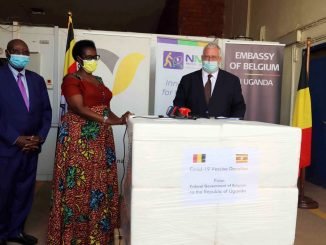
Kampala, Uganda | URN | The Government of Uganda through Uganda Investment Authority (UIA), has intervened to promote the COVID-19 herbal treatment solution Covidex, an innovation by Mbarara University of Science and Technology Professor, Patrick Engeu Ogwang.
Prof. Ogwang caught the eye of the public, the government and the international community last month following testimonies about Covidex as vital in the treatment of COVID-19.
The popularity of Covidex was reflected in the skyrocketing price of the 20 millilitre bottle of the solution from 3,000 to 80,000 shillings after it had been approved by the National Drug Authority (NDA).
While many saw Prof. Ogwang and his innovation as a blessing, his employer and some lawyers came out to challenge his claim of ownership of Covidex, on grounds that it was developed under a university program and that he used government resources to develop it.
As these differences continue, UIA is to facilitate the development of herbal medicine and Prof Ogwang’s company, Jena Herbals Ltd.
UIA and Prof. Ogwang “will explore a range of issues including the issuance of an investment license, investment incentives, formalization of Covidex and other medicinal products, investment and business support, amongst others,” says a statement from the UIA.
Before the solution was recognized by the National Drug Authority, then presidential advisor on Epidemics and COVID-19, Dr Monica Musenero expressed government willingness to help Prof. Ogwang if he went through the right channels to notify the government.

Last week, ahead of the planned meeting with President Yoweri Museveni, Vice President Jessica Alupo, Prof Ogwang and members of the Aga Khan Foundation, they “discussed ways of supporting Covidex production on a large scale,” according to Alupo.
Robert Mukuza, the new Director-General of Uganda Investment Authority (UIA) vowed to put domestic entrepreneurs on top of the development agenda.
“Under my leadership, the UIA will play a critical role in awakening Ugandans into the modern money economy, to “secure their future” through pursuing several priorities which are in line with the National Development Plan III and the current UIA strategic plan. We will also prioritize the needs of our domestic investors and Micro, Small and Medium-sized enterprises, focus on creating jobs and wealth for our youth and improve the agility and customer responsiveness of the UIA to the needs of investors,” said Mukiza on his plans for Ugandan investors.
The Uganda Investment Authority (UIA) is an agency charged with attracting, facilitating and promoting investments, both local and foreign.
There have been persistent claims that the UIA focuses on foreign investors and does little or nothing for the local investors, especially the Micro, Small and Medium Enterprises, MSMEs.
The UIA refutes this and says it has even established an SME division, which is especially aimed at handling this category of investors, most of whom are domestic enterprises.
“The SME Division (SMED) of UIA supports and facilitates the development of MSMEs who are majorly domestic entrepreneurs. The overall goal of the SME division is: Developing Sustainable Domestic Investments & SME’s,” says Uganda Investment Authority (UIA) in a statement.
These include an Entrepreneurship Training Program, to enable entrepreneurs to access and utilize appropriate business skills, information and services aimed at achieving a sustainable and competitive private sector in the long run.
This mainly targets those intending to start a business, businesses in the early stages, businesses interested in expanding and Small and Medium Enterprises (SMEs).
UIA’s other role is to provide hands-on Technical Skill Training for value addition aimed at building capacities of MSMEs.
Under the Cluster Development and Business Linkages program, UIA helps domestic entrepreneurs to integrate their business systems into global value chains by providing economies of scale.
“Cluster development helps to address the challenges of isolation in small firms by creating a critical mass of mutually beneficial business relations, linking an SME to a bigger company (including Trans-National Companies).
The programme nurtures SMEs to meet regional and international business standards and encourage TNCs to source locally from the SME clusters instead of sourcing from foreign firms,” the statement says.
Read Also: Gulu University alleges Covilyce 1 cures COVID-19 within 72 hours
The UIA also has business incubators that help both start-ups and existing small businesses to grow sustainably, hence lowering the mortality rate through good businesses practices and appropriate technology.
Uganda Investment Authority (UIA) is currently establishing a mixed-use business incubation centre at Kampala Industrial Business Park in Namanve to facilitate, support and nurture MSMEs.
This will assist emerging companies to gain access to mentors, training, shared space, professional assistance and capital among other services that will move them onto the fast-track to success.
In addition, SME Division is planning to establish at least 500 workspaces and common facility centres for the small scale industrialists in each of the UIA Industrial and Business Parks.
If Prof Ogwang is to get an investment license for his Jena Herbals Ltd from the UIA, he will have to ensure its capital is at least 50,000 US Dollars or 178 million shillings, the requirement for domestic companies, while foreign firms must have a capital investment that exceeds 250,000 dollars (445 million shillings).



